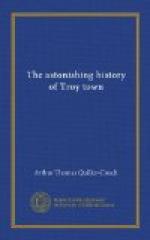“Of course I have been reading ‘Ivy Leaves.’ So mournful I thought them, yet somehow so attractive. How did you write it all?”
Mr. Moggridge confessed amiably that he “didn’t quite know.”
“Let me see; those lines beginning—”
‘O give me wings to—to—’
“I forget for the moment how it goes on.”
“‘To fly away,’” suggested the bard.
“Ah, exactly; ‘to fly away.’ So simple—just what one would wish wings for, you know. It struck me very much when I read it. When did you think of it, Mr. Moggridge?”
The poet blushed and began to look uncomfortable.
“Ah! you are reticent. Excuse me; I ought not to probe a poet’s soul. Still, I should like to be able to tell my friends—”
“The—the fact is,” stammered Mr. Moggridge, “I—I thought of them— in—my bath.”
Mrs. Goodwyn-Sandys leaned back and laughed—a pretty rippling laugh that shook the diamonds upon her throat. Sam guffawed, and by this action sprang that little rift between the friends that widened before long into a gulf.
“I shall ask you to copy them into my Album. I always victimise a lion when I meet one.”
This was said with a glance full of compensation. Mr. Moggridge tried to look very leonine indeed. Across the room another pair of eyes gently reproached him. Never before had he tarried so long from Sophia’s side. Poor little heart! beating so painfully beneath your dowdy muslin bodice. It was early yet for you to ache.
“Oh, ah, Dick Cheddar—knew him well,” came in the sonorous tones of the Honourable Frederic from the whist-table. “So you were at College with him—first cousin to Lord Stilton—get the title if he only outlives the old man—good fellow, Dick—but drinks.”
“Dear me,” said the Vicar; “I am sorry to hear that. He was wild at Christchurch, but nothing out of the way. Why, I remember at the Aylesbury Grinds—”
Miss Limpenny, who did not know an Aylesbury Grind from a Bampton Lecture, yet detected an unfamiliar ring in the Vicar’s voice.
“He fought a welsher,” pursued the Vicar, “just before riding in a race. ‘Rollingstone,’ his horse was, and Cheddar’s eyes closed before the second fence. ‘Tom,’ he called to me—I was on a mare called Barmaid—”
I ask you to guess the amazement that fell among us. He—our Vicar— riding a mare called Barmaid! Miss Limpenny cast her eyes up to meet the descent of the thunderbolt.
“Lord Ballarat was riding too,” the Vicar went on, “and young Tom Beauchamp, son of the Bishop—”
“Died of D.T. out at Malta with the Ninety-ninth,” interpolated the Honourable Frederic.
“So I heard, poor fellow. Three-bottle Beauchamp we called him. I’ve put him to bed many a time when—”
It was too much.
“In the Great Exhibition of 1851,” began Miss Priscilla severely.




